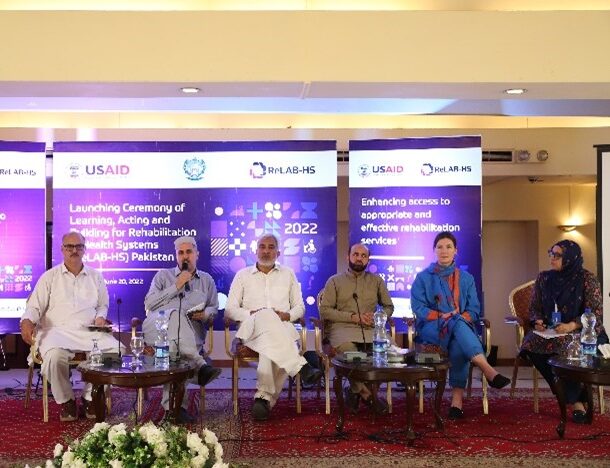
Nukhba Zia, ReLAB-HS co-program technical coordinator, (far right) moderates a panel discussion in Peshawar, Khyber Pakhtunkhwa province, during the ReLAB-HS launch. Panelists were, from left to right, Malik Liaqat, PIPOS Managing Director; Dr. Nisar Uddin, head of department Rehabilitation Department Saidu Sharif Teaching Hospital Swat; Illyas Muhammad, CEO Paraplegic Centre Peshawar; Dr. Irfan Ullah, Khyber Medical University director, and Rachael Lowe, Physiopedia director. Photos by Assad Abbas
By Assad Abbas for ReLAB-HS
Learning, Acting, and Building for Rehabilitation in Health Systems (ReLAB-HS) officially launched in Pakistan in June. Two formal ceremonies took place, one on June 20 in Peshawar, Khyber Pakhtunkhwa (KP), and another on June 23 in Karachi, Sindh.
These launch events formally introduced ReLAB-HS in the provinces and brought key stakeholders together to facilitate meaningful discussions about the importance of strengthening rehabilitation and assistive technology (AT) services and promoting their integration into Pakistan’s health system. Both launch ceremonies began with formal recitations from the Holy Quran, followed by a video message from ReLAB-HS Program Director, Dr. Abdulgafoor Bachani.
“Together, we will improve health systems for the people of Pakistan,” Bachani said. “We look forward to working together to develop, implement, adapt, and sustain solutions to improve the health outcomes and make a difference for those persons who depend upon rehabilitation services and assistive technology.”
In his welcome remarks, Dr. Irfan Ullah, District Health Officer (DHO) Swat said, “the people of Swat have a great need for rehabilitation and AT, and it will be a great opportunity to work on activity integration.”
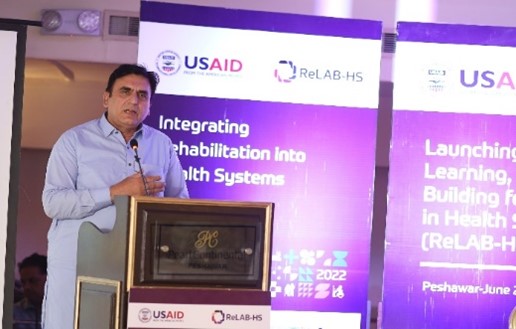
Dr. Irfan Ullah, District Health Officer Swat, speaks at the ReLAB-HS launch event in Peshawar.
The chief guest of KP launch, Dr. Farooq Jamil, Special Secretary of Health, KP, noted that people with disabilities are among the most neglected in society and expressed the provincial government’s commitment to ensuring services through increased funding for rehabilitation and AT.
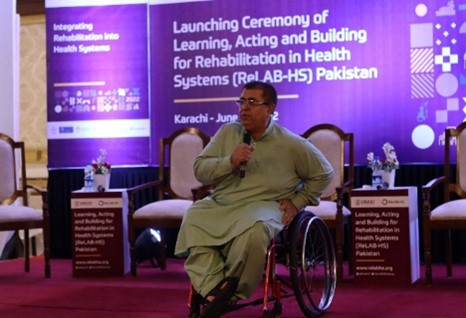 Dr. Ghulam Nabi Nizamani, the Director General of Department for Persons with Disabilities, speaks at the ReLAB-HS launch event in Karachi.
Dr. Ghulam Nabi Nizamani, the Director General of Department for Persons with Disabilities, speaks at the ReLAB-HS launch event in Karachi.
In Sindh province, Dr. Ghulam Nabi Nizamani, the Director General of Department for Persons with Disabilities (DEPD), said ReLAB-HS’ efforts would be an addition to the efforts of the government of Sindh on rehabilitation and AT services.
In Sindh, the chief guest was Muhammad Khan Ranjha, Secretary for the DEPD, while Dr. Talib Lashari, Special Assistant to Chief Minister of Health, Sindh, was the guest of honor.
Among other key speakers were Ms. Kishwer Zehra, a Member of National Assembly, and Ms. Kulsoom Chandio, a Member of the Provincial Assembly for Sindh.
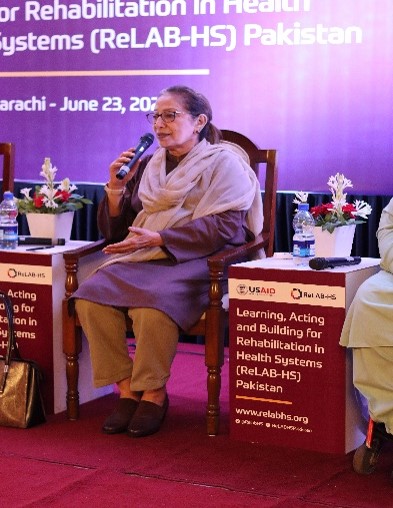 Kishwer Zehra, a Member of National Assembly, speaks at the ReLAB-HS launch in Pakistan.
Kishwer Zehra, a Member of National Assembly, speaks at the ReLAB-HS launch in Pakistan.
In their remarks, the speakers committed their full support to contribute at the policy and professional levels by advocating for rehabilitation and AT services to be an integral part of the health system.
As part of launch activities, Waqar Qureshi, ReLAB-HS Country Coordinator Pakistan and Dr. Nabeel Akram, ReLAB-HS Director Operations, gave an overview of ReLAB-HS. They spoke about ReLAB-HS objectives and how the consortium is aiming to strengthen an inclusive and accessible health system.
“ReLAB-HS will be partnering with the provincial governments of KP and Sindh, to better align the rehabilitation and AT services within health system while using a networks of care approach from local to district level,” Qureshi added.
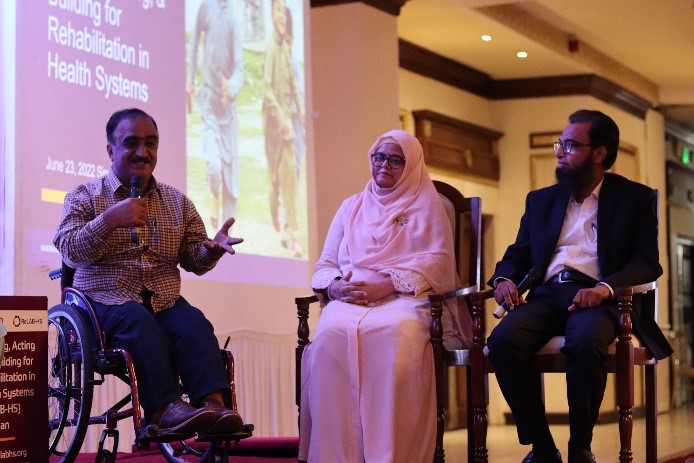 Javid Rais, (left) Disabled Welfare Association, speaks during a panel discussion at the ReLAB-HS launch in Karachi, Sindh. The two other panelists pictured are Dr. Sumaira Farooqui, professor at Principle College of Rehabilitation Sciences Ziauddin University Karachi and Dr. Syed Imran Ahmed, Sindh Institute of Physical Medicine and Rehabilitation deputy executive director.
Javid Rais, (left) Disabled Welfare Association, speaks during a panel discussion at the ReLAB-HS launch in Karachi, Sindh. The two other panelists pictured are Dr. Sumaira Farooqui, professor at Principle College of Rehabilitation Sciences Ziauddin University Karachi and Dr. Syed Imran Ahmed, Sindh Institute of Physical Medicine and Rehabilitation deputy executive director.
As the ReLAB-HS launch events were intended to be highly participatory, a panel discussion centered on the topic “Enabling Environment for Rehabilitation and AT Services” and a World Café session was also part of the launch day.
Each panel represented a diverse range of stakeholders in order to provide a range of perspectives on the topic. Representatives from the Pakistan Institute of Prosthetic and Orthotic Science (PIPOS) Peshawar, the Saidu Group of Teaching Hospitals Swat, the Paraplegic Centre Peshawar, the Institute of Physical Rehabilitation and Medicine at Khyber Medical University, and Physiopedia were on the panel in KP. In Sindh, the panel included representatives from the National Assembly; the DEPD; the Disabled Welfare Association; PPHI Sindh; Sindh Institute of Physical Medicine and Rehabilitation; and the College of Rehabilitation Sciences, Ziauddin University. In their discussion, the panelists elaborated on their views on rehabilitation and AT needs, and the key takeaway from this discussion was to work together to create an enabling environment for the integration of rehabilitation and AT services.
For the World Café session, participants rotated in small groups of working stations to discuss rehabilitation and AT users, leadership and governance, financing rehabilitation and AT, products and technologies, health information and workforce service delivery. The activity offered the participants a platform and opportunity to deliberate on the challenges associated with each aforementioned component, potential areas of innovation, barriers to change, and any pertinent information specific to the local context.
These discussions led to recommendations, such as the need for effective legislation and the implementation of existing laws to strengthen rehabilitation and AT, adequate funding in provincial budgets, and integration of rehabilitation into the health information system. Other recommendations were capacity building of the workforce so they could identify people with disabilities and refer them to appropriate services and including rehabilitation in the curriculum of medical and paramedical staff trainings. Participants also emphasized need for effective interdepartmental coordination between the Social Welfare Department, the Health Department, and organizations for persons with disabilities.
Building on the momentum generated by the launch, ReLAB-HS will continue to collaborate with and learn from key stakeholders in order to address challenges, share lessons learned, and improve the integration of rehabilitation and AT services in the health system.
ReLAB-HS is made possible by the generous support of the American people through the United States Agency for International Development.